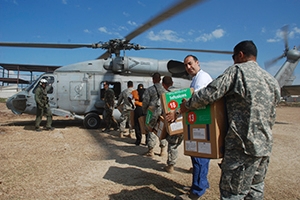Business
Racing Against the Clock: Vaccination In Haiti

Dr. Malek Sbih unloads vaccines from a helicopter.
In as little as 24 hours, an Amazon package arrives on a doorstep satisfying the consumer’s need to have the latest and greatest luxury items with the click of a button. But how important are those trendy boots or the newest e-reader? After all, survival doesn’t depend on their delivery.
But for Dr. Malek Sbih, MBA ’05, racing the clock to deliver vaccines in the heart of Haiti is the difference between life and death for many people. Sbih managed Haiti’s vaccine logistics, also known as cold chains, while working at the World Health Organization (WHO). Vaccines traveled, under his supervision, in carriers designed to keep contents cold, but only for 24 hours.
"If [vaccines] are not refrigerated, they lose the active ingredients and we cannot use them anymore," said Sbih.
Urban areas accommodated vaccines’ curfews with quick transport times between refrigerators and vaccination sites, but distributing to inaccessible areas required more planning.
"Teams hiked a whole day with donkeys to access remote areas, but… had to make sure that the vaccines did not stay out for more than 24 hours, so all the operations had to be complete within that time frame," said Sbih.
During his work with the WHO, Sbih realized the inefficiency of trekking on foot and looked for a faster alternative. He found it in an unlikely mode: motorcycles.
"I realized that with all the money from [the Centers for Disease Control] and partners, all the funds that we had, we were not able to vaccinate thousands and thousands of kids because they were in remote areas we were not able to access," said Sbih.
To combat this problem, Sbih started LogiSanté, a nongovernment organization (NGO) dedicated to distributing and vaccinating inaccessible areas of Haiti via motorcycle. Sbih found that using motorcycles to transport vaccines cut the commute time down to one hour making deliveries to remote distribution centers easier.
Motorcycles maneuver easier through the terrain accessing otherwise unreachable towns. He started LogiSanté's pilot program with 100 motorcycles and, funds permitting, plans to expand distribution to encompass all kinds of medicines.
"I think we can add value to the health system and to the existing routine vaccination system by delivering vaccines to those areas that are very difficult to access. We want to focus our energy exclusively to those areas," said Sbih.
With his business plan in order, Sbih continues building support for LogiSanté stateside. He hopes to partner with his alma mater to not only use LogiSanté as a case study for the classroom, but to also recruit employees.
